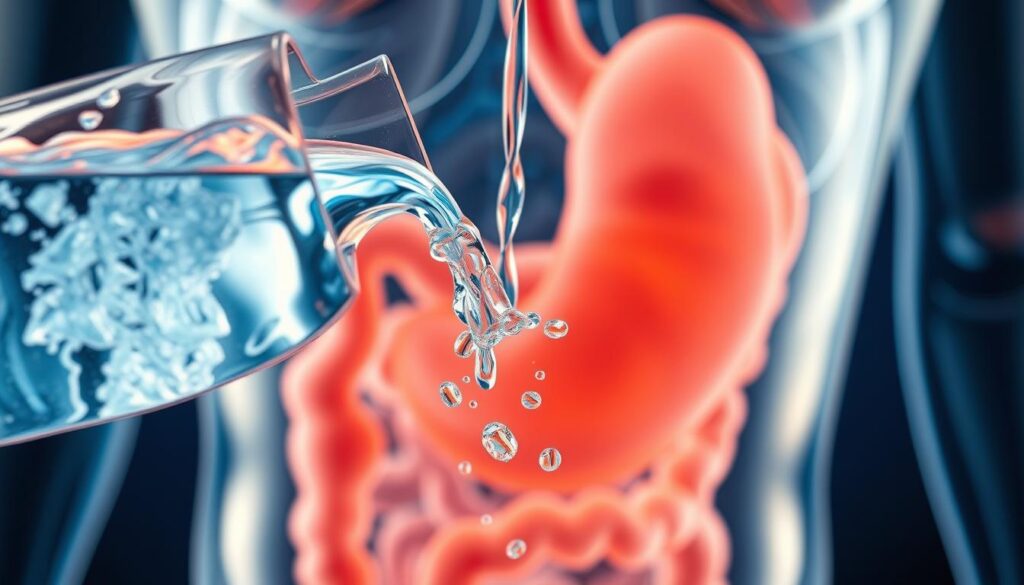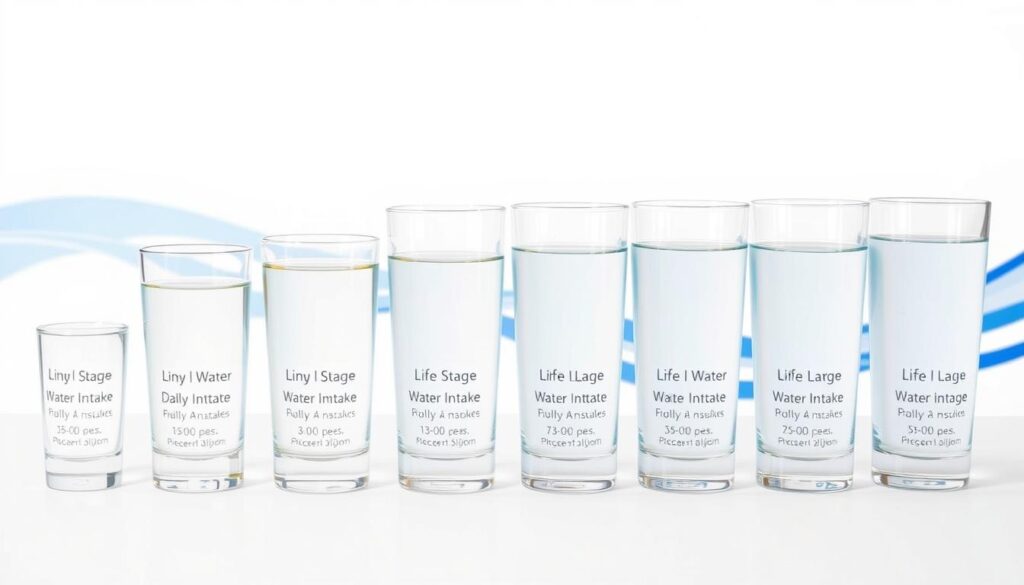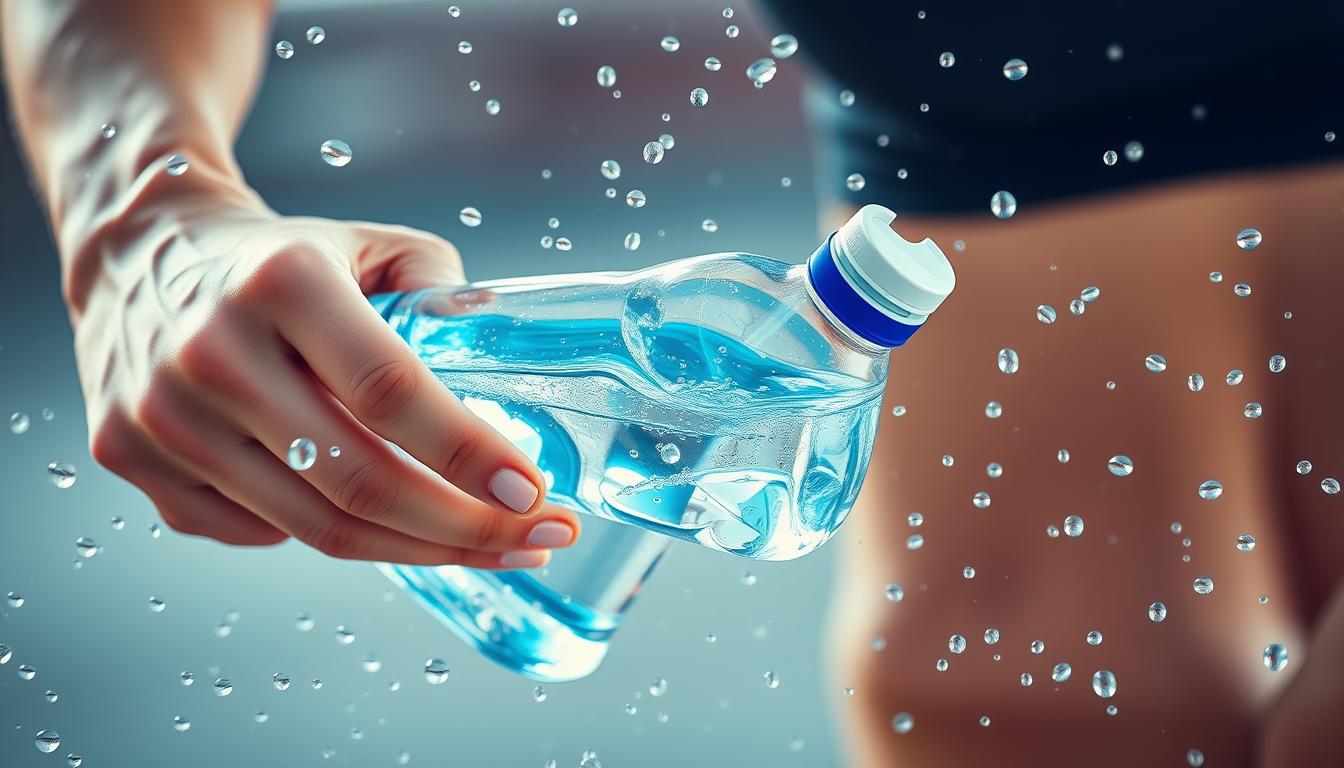Water is key to life, and staying hydrated is vital for good health. It’s an important nutrient that helps with many body functions. This makes it crucial for your overall well-being.
Studies show that older people are more likely to be dehydrated. Being well-hydrated is important for both your body and mind. It’s especially important for kids’ brain health.
Research finds that how much water you drink affects your body fat and health changes over time. Pregnant and nursing moms need more water for their health. Adding more water to your diet can change your body and boost your health.
Key Takeaways
- Water is an essential nutrient that plays a crucial role in maintaining optimal health
- Hydration status varies among different populations, with older adults being at a higher risk of dehydration
- Proper hydration is vital for cognitive functions, especially in children
- Hydration levels can impact body fat estimation and are influenced by the nutrition transition in different countries
- Pregnant and lactating women have increased water intake requirements to support their unique needs
- Incorporating a water-rich diet can help transform your body and enhance overall health
The Importance of Staying Hydrated for Optimal Health
Drinking enough water is key to staying healthy. Water helps control body temperature, move nutrients, and remove waste. Not having enough fluids can lead to dehydration, which harms your health. Drinking enough water helps avoid dehydration and keeps you healthy.
How Dehydration Affects the Body
Dehydration happens when you lose more fluids than you take in. This can upset your electrolyte balance and slow down your body’s functions. Even a little dehydration can make you feel tired, give you headaches, and lower your thinking skills. If dehydration gets worse, it can cause serious problems, such as:
- Impaired temperature regulation, increasing the risk of heat-related illnesses
- Decreased blood volume, which can cause a drop in blood pressure and strain the heart
- Impaired kidney function, leading to a buildup of waste products in the body
- Constipation due to decreased water content in the digestive tract
- Increased risk of urinary tract infections and kidney stones
Some people are more likely to get dehydrated, like kids, older adults, and those with ongoing health issues. Older adults might not feel thirsty or regulate fluids well, making dehydration more likely. Kids have more water in their bodies and can’t control their temperature as well, making them more prone to dehydration and heat-related illnesses.
Signs and Symptoms of Dehydration
Knowing the signs of dehydration is important for staying healthy. Look out for these signs:
- Thirst and dry mouth
- Dark-colored urine or decreased urine output
- Fatigue and weakness
- Dizziness and headaches
- Dry skin and lips
- Rapid heartbeat and breathing
- Confusion and irritability
If you notice these symptoms, drink more fluids and see a doctor if they get worse. Doctors can check for dehydration with blood and urine tests.
“Up to 40% of elderly people may be chronically underhydrated, according to a study from the University of California, Los Angeles School of Nursing.”
To stay hydrated and keep your health in check, drink fluids all day, even if you’re not thirsty. Aim for about 8 glasses or 2 liters of water a day, but your needs may vary. By paying attention to your hydration and knowing the signs of dehydration, you can make sure your body gets the fluids it needs.
The Role of Water in Nutrient Absorption and Digestion
Water is key to our body’s digestive system and how it absorbs nutrients. Drinking enough water helps our body digest food well and absorb nutrients from it. It breaks down food, dissolves nutrients, and moves them to the bloodstream for use.

Drinking enough water is vital for making digestive juices like saliva, stomach acid, and pancreatic enzymes. These juices break down food, making it easier for our body to get nutrients. Without enough water, our digestive system can get slow, causing problems like constipation and discomfort.
Water is essential for the proper functioning of the digestive system. It helps to keep the intestines lubricated, allowing waste to pass through more easily and preventing constipation.
Water also protects tissues in our body, like the spinal cord and joints. It keeps them cushioned and lubricated, lowering the chance of getting hurt or feeling pain.
Water is key for getting rid of waste through urination, sweating, and bowel movements. Keeping enough water in our body helps us get rid of toxins and stay healthy.
- Urination
- Perspiration
- Bowel movements
Drinking enough water helps our body work well and stay healthy. It makes sure we can get rid of toxins and waste properly.
| Bodily Function | Role of Water |
|---|---|
| Digestion | Breaks down food particles and dissolves nutrients |
| Nutrient Absorption | Transports nutrients to the bloodstream for distribution |
| Waste Removal | Eliminates toxins through urination, perspiration, and bowel movements |
Adults need to drink enough water to help with digestion and nutrient absorption. The National Academy of Medicine says men should drink about 13 cups (3 liters) a day. Women should aim for 9 cups (2.2 liters). Drinking water and eating foods with a lot of water helps our digestive system work right.
Hydration and Health: How a Water-Rich Diet Can Transform Your Body
Eating foods full of water can greatly improve your health and well-being. Adding fruits, vegetables, and other hydrating foods to your meals can change how you feel. A well-hydrated body is key for good health, and eating foods with lots of water helps achieve this.
Boosting Skin Health and Radiance
Drinking enough water is great for your skin. It keeps your skin elastic and reduces wrinkles. Foods like watermelon, strawberries, and cucumbers are very hydrating. They give your skin the moisture it needs to look healthy and bright.
Supporting Weight Management Efforts
A water-rich diet also helps with weight control. Foods like fruits and veggies are low in calories but high in fiber. This makes you feel full and eat less. For example, eating a cup of cantaloupe instead of chips can cut down on calories and still give you nutrients and hydration.
Enhancing Energy Levels and Mental Clarity
Drinking enough water is key for staying energetic and focused. Being dehydrated can make you tired, give you headaches, and make it hard to concentrate. But, eating foods like peaches and oranges can keep you hydrated and give you energy with their natural sugars and important nutrients.
| Food | Water Content | Additional Benefits |
|---|---|---|
| Lettuce | 96% | 1 gram of fiber and essential vitamins per cup |
| Zucchini | 94% | Various health benefits per 1-cup serving |
| Broths and Soups | 92% | Low in calories, may aid in hydration and weight loss |
| Skim Milk | 91% | Rich in calcium and riboflavin |
Adding water-rich foods to your diet can change your life. You’ll see better skin, more energy, and easier weight control. So, choose foods that are both nutritious and hydrating for the best health and happiness.
Water Intake Recommendations for Different Life Stages
Drinking enough water is key to staying healthy. But, how much water you need changes with age, gender, pregnancy, and how active you are. Knowing what you need at different times in life helps make sure you get enough fluids. This supports your body’s functions and keeps you feeling good.

Hydration Needs for Children and Adolescents
Kids and teens need more water because their bodies are growing. Kids should get 4 to 5 cups of fluids a day. Teens should aim for 6 to 8 cups. It’s important to get kids and teens to drink water often, especially when they’re active or in the heat. This helps prevent dehydration and supports their growth.
Fluid Requirements for Adults and Seniors
Adults need about 10 cups of fluids a day, men, and 8 cups, women. But, you might need more if you’re very active or live in a hot place. Seniors might not feel as thirsty, which can lead to dehydration. Encouraging older adults to drink water and eat foods with lots of water can help them stay hydrated.
| Age Group | Male | Female |
|---|---|---|
| Children (4-8 years) | 5 cups (1.2 liters) | 5 cups (1.2 liters) |
| Adolescents (9-18 years) | 8 cups (1.9 liters) | 7 cups (1.6 liters) |
| Adults (19+ years) | 10 cups (2.6 liters) | 8 cups (2.1 liters) |
Increased Hydration Demands During Pregnancy and Breastfeeding
Pregnant and breastfeeding women need more water. Pregnant women should try to drink about 10 cups of fluids a day. Breastfeeding women should aim for 13 cups. Drinking enough water is very important for the health of both mom and baby.
The National Academies of Sciences, Engineering, and Medicine recommend an intake of about 3.7 liters of fluid for men and 2.7 liters of fluid for women daily.
By following water intake guidelines for different life stages, you can keep your body well-hydrated. This supports your health and overall well-being.
Strategies for Increasing Daily Water Consumption
Drinking enough water is key to staying healthy, but many find it hard to get enough throughout the day. Luckily, there are ways to boost your water intake. These strategies will help your body get the hydration it needs to work well.
Incorporating Water-Rich Foods into Your Diet
Eating foods high in water is a great way to increase your fluid intake. Many fruits and vegetables are mostly water, helping you stay hydrated. Here are some top choices:
- Watermelon (92% water)
- Strawberries (91% water)
- Cantaloupe (90% water)
- Peaches (89% water)
- Oranges (88% water)
- Cucumber (96% water)
- Lettuce (96% water)
- Zucchini (95% water)
- Celery (95% water)
- Tomatoes (94% water)
Adding these foods to your meals and snacks can help you drink enough water. They also give you important nutrients and fiber.
Making Water More Appealing with Natural Flavors
If plain water doesn’t excite you, try adding natural flavors. Infusing your water with fruits, vegetables, or herbs makes it tasty without adding calories or artificial sweeteners. Here are some great mixes:
- Lemon and mint
- Cucumber and basil
- Strawberry and basil
- Orange and rosemary
- Grapefruit and thyme
Try different flavors to find what you like best. This makes drinking water fun and interesting.
Setting Reminders and Tracking Intake
It’s easy to forget to drink water when you’re busy. Setting reminders and tracking your water can help you stay on track. Here are some tips:
- Use a water tracking app to log your intake and set daily goals
- Set reminders on your phone or smartwatch to drink water at regular times
- Keep a reusable water bottle with you all day and refill it as needed
- Use a marked water bottle to see your progress and stay motivated
- Choose water over sugary drinks like soda, juice, or sweetened coffee
| Strategy | Benefits |
|---|---|
| Water-rich foods | Increases fluid intake, provides nutrients and fiber |
| Natural flavors | Makes water more appealing, avoids artificial sweeteners |
| Reminders and tracking | Helps maintain consistency, visualizes progress |
Using these strategies can greatly increase your daily water intake. This supports your health and well-being.
The Impact of Hydration on Exercise Performance and Recovery
Drinking enough water is key for doing your best in exercise and getting better after it. When you work out, you lose fluids through sweat. If you don’t drink enough water, you can get dehydrated. This can make you tired, slow you down, and mess with your thinking.
Dehydration can hurt your performance in any weather. Athletes in sports like tennis, running marathons, or playing football should watch their water intake closely. Not drinking enough water can make them slower, weaker, and less accurate.
Kids and teens doing sports are especially at risk of getting too hot and dehydrated. They need to drink plenty of water during sports and games. Parents and coaches should make sure they do.
Drinking enough water is also important for getting better after working out. Being dehydrated can make your body stressed, which slows down recovery. Drinking water helps fix fluid levels, keep your body cool, and move nutrients to your muscles for fixing and building.
To stay hydrated for exercise and recovery, start by drinking water before you work out. Keep drinking fluids during your activity. How much you need depends on how hard you’re working out, how long you’re doing it, and how much you sweat.
Pay attention to how thirsty you feel and check the color of your urine. This can tell you if you need more water. Drinking enough water is a big part of doing well in sports and staying healthy.




